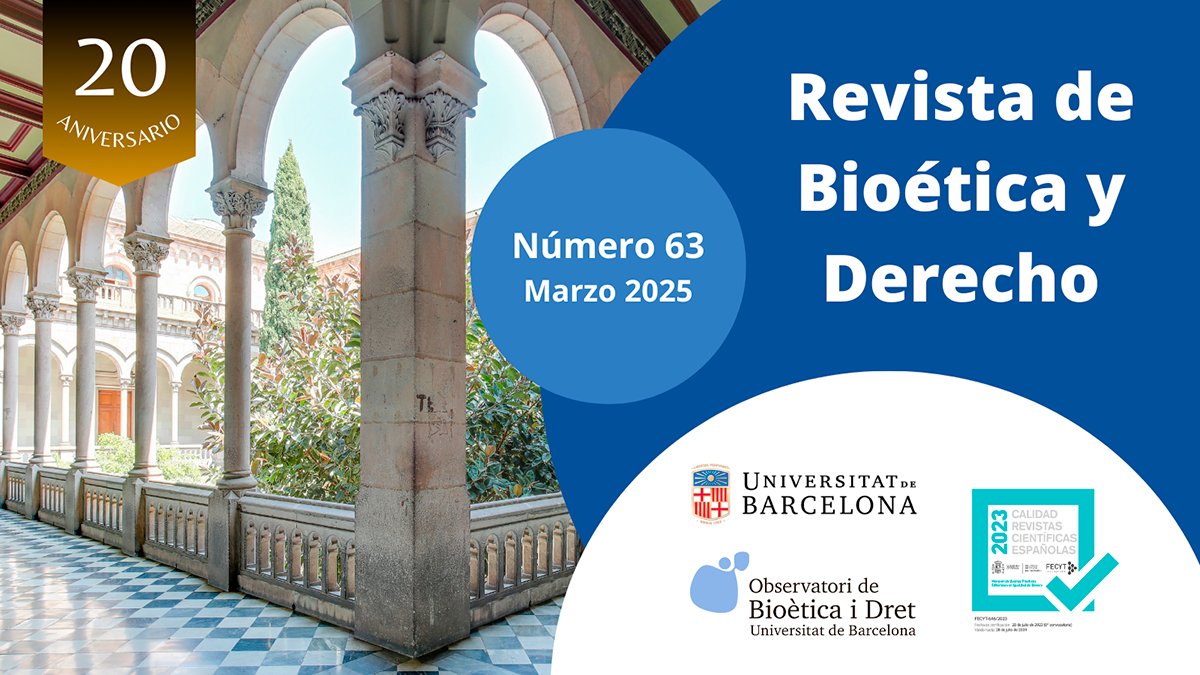Regulation of the secondary and incidental findings in genetic testing: from the clinical domain to the European Health Data Space
DOI:
https://doi.org/10.1344/rbd2025.63.47664Keywords:
genetic testing, secondary findings, incidental findings, data protection, GDPR, European Health Data Space, geneticsAbstract
The development and availability of high-performance omics technologies, such as whole exome sequencing (WES) and whole genome sequencing (WGS), bring new ethical and legal challenges. In this policy review, we address the challenges related to managing potentially clinically relevant secondary and incidental findings unrelated to the primary indication of genetic testing. With the aim of providing clarity on the applicable legislation to these findings and to enable collective foresight, planning and management of them, we analyse two fundamental legal frameworks: the sectoral legislation - health and biomedical research - applicable to genetic testing and the personal data protection legislation. The main result of this analysis provides a table showing the different approaches to be taken to manage these findings depending on whether they are secondary or incidental, and whether they are generated in clinical or research contexts, including secondary uses of data such as the European Health Data Space.
References
Abellán-García Sánchez, F. (2019). Pruebas genéticas en los tratamientos de reproduccion asistida, con especial referencia a los tests de portadores y matching genético. Revista de Derecho y Genoma Humano: Genética, Biotecnología y Medicina Avanzada, Extra, 325–348.
Alfonso Farnós, I., Alcalde Bezhold, G., & Méndez García, M. (2019). Evaluación de proyectos de investigación con tecnología Big Data por un Comité de Ética de la investigación. Revista de Derecho y Genoma Humano: Genética, Biotecnología y Medicina Avanzada, Extra, 349–393.
Ayuso, C., & Dal-Ré, R. (2016). Comunicación de los resultados a los participantes en la investigación genética de las enfermedades raras. In Ética de la investigación de las enfermedades raras (pp. 57–72).
Ayuso, C., Millán, J. M., Mancheño, M., & Dal-Ré, R. (2013). Informed consent for whole-genome sequencing studies in the clinical setting. Proposed recommendations on essential content and process. European Journal of Human Genetics, 21(10), 1054–1059. https://doi.org/10.1038/ejhg.2012.297.
Brown, C. M., Amendola, L. M., Chandrasekhar, A., Hagelstrom, R. T., Halter, G., Kesari, A., Thorpe, E., Perry, D. L., Taft, R. J., & Coffey, A. J. (2024). A framework for the evaluation and reporting of incidental findings in clinical genomic testing. European Journal of Human Genetics. https://doi.org/10.1038/s41431-024-01575-1.
Elfatih, A., Mohammed, I., Abdelrahman, D., & Mifsud, B. (2021). Frequency and management of medically actionable incidental findings from genome and exome sequencing data: a systematic review. Physiological Genomics, 53(9), 373–384. https://doi.org/10.1152/physiolgenomics.00025.2021.
Grupo de Trabajo sobre Protección de Datos del Artículo 29. (2017). Directrices sobre la evaluación de impacto relativa a la protección de datos (EIPD) y para determinar si el tratamiento «entraña probablemente un alto riesgo» a efectos del Reglamento (UE) 2016/679.
Nicolás Jiménez, P. (2019). Los derechos sobre los datos utilizados con fines de investigación biomédica ante los nuevos escenarios tecnológicos y científicos. Revista de Derecho y Genoma Humano: Genética, Biotecnología y Medicina Avanzada, Extra, 129–167.
Phillips, A., Bronselaer, T., Borry, P., Van Hoyweghen, I., Vears, D. F., Pasquier, L., & Callens, S. (2022). Informing relatives of their genetic risk: an examination of the Belgian legal context. European Journal of Human Genetics, 30(7), 766–771. https://doi.org/10.1038/s41431-021-01016-3.
Recuero, M. (2024). El uso secundario de datos de salud electrónicos: el futuro Reglamento del Espacio Europeo de Datos de Salud y su interacción con la protección de datos personales. InDret, 2, 525–551.
Richer, J., & Laberge, A.-M. (2019). Secondary findings from next-generation sequencing: what does actionable in childhood really mean? Genetics in Medicine, 21(1), 124–132. https://doi.org/https://doi.org/10.1038/s41436-018-0034-4.
Romeo Casabona, C. M., Nicolás Jiménez, P., & de Miguel Beriain, I. (2018). Retos éticos y necesidades normativas en la actividad asistencial en Medicina Personalizada de Precisión.
Vears, D. F., Hallowell, N., Bentzen, H. B., Ellul, B., Nøst, T. H., Kerasidou, A., Kerr, S. M., Th. Mayrhofer, M., Mežinska, S., Ormondroyd, E., Solberg, B., Sand, B. W., & Budin-Ljøsne, I. (2023). A practical checklist for return of results from genomic research in the European context. European Journal of Human Genetics. https://doi.org/10.1038/s41431-023-01328-6.
Wolf, S. M., & Green, R. C. (2023). Return of Results in Genomic Research Using Large-Scale or Whole Genome Sequencing: Toward a New Normal. Annual Review of Genomics and Human Genetics, 24. https://doi.org/10.1146/annurev-genom-101122-103209.
Downloads
Published
How to Cite
Issue
Section
License
Copyright (c) 2024 Guillermo Lazcoz Moratinos, Pilar Nicolás Jiménez, Carmen Ayuso García

This work is licensed under a Creative Commons Attribution-NonCommercial-NoDerivatives 4.0 International License.
 The author retains the copyright and grants Revista de Bioética y Derecho the right of first publication of the article. All articles published in Revista de Bioética y Derecho are under Creative Commons licensing Recognition – Non Commercial – NoDerivedArtwork (by-nc-nd 4.0), which allows sharing the content with third parties, provided that they acknowledge its authorship, initial publication in this journal and the terms of the license. No commercial use of the original work or generation of derivative works is permitted.
The author retains the copyright and grants Revista de Bioética y Derecho the right of first publication of the article. All articles published in Revista de Bioética y Derecho are under Creative Commons licensing Recognition – Non Commercial – NoDerivedArtwork (by-nc-nd 4.0), which allows sharing the content with third parties, provided that they acknowledge its authorship, initial publication in this journal and the terms of the license. No commercial use of the original work or generation of derivative works is permitted.







